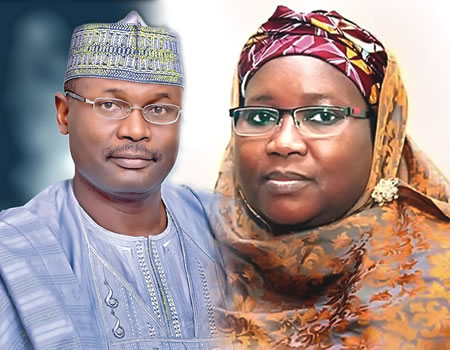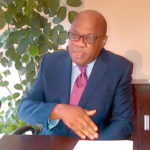Chairman of the Independent National Electoral Commission (INEC), Professor Mahmood Yakubu, appears to be getting used to receiving jabs and uppercuts from political parties in the build-up to major elections. As the 2019 election draws near, it is emerging that the don is not in any way tired of receiving blows from his customers; the political stakeholders.
Corpse of Ondo deputy governor’s daughter shaved before burial ― Pathologist
Since last week, a battle has been on between INEC and leaders of some registered political parties over the guidelines for the conduct of the February 16, 2019 elections and the state elections that will hold on March 2. The first hint of the discordant tunes oozing out of the political parties emanated last week following a meeting between INEC and party leaders where the voters register for the election was unveiled. After the release of the list of voters, INEC also took the political parties through the guidelines being prepared for the election. Though it said that details of the guidelines would be released in one week, the political parties immediately took offence at the hints already provided by INEC.
The parties raised objection at the planned simultaneous accreditation and voting in the election and also the provision that would make persons whose fingerprints could not be recognised by the Smart Card Readers to vote after thumb-printing a document and submitting their phone numbers.
According to the parties, though INEC said it had discarded the Incidence Forms, which were widely misused in the 2015 elections, the adoption of the new procedure which would allow people who were not captured by the Smart Card Readers to vote would amount to introduction of the Incidence Forms through the back door. They insisted that there could be connivance at some levels during the elections that could make unauthorised persons vote. The parties are also of the view that failure to determine the number of accredited persons before voting commences could also give room for manipulations.
Having raised initial objections to the guidelines, 61 of the 91 registered political parties last Friday released details of their objections and asked INEC to revise the guidelines.
According to the parties, no fewer than eight of the clauses in the said guidelines are found to be objectionable. The parties said that some of the clauses were injected into the guidelines to scuttle the elections adding that the appointment of Mrs. Amina Zakari as the coordinator of the national collation centre should also be reversed, while she should be replaced with another Federal Commissioner in charge of Operation, Professor Okechukwu Ibeanu.
In a statement made public by the National publicity secretary of the Inter-Party Advisory Counci (IPAC), Ikenga Ugochinyere, the 61 parties said that they were seeking the retention of separate accreditation and voting times as contained in the guidelines for 2011 and 2015 elections. According to them such a measure would help forestall rigging.
The parties, according to Ugochinyere, demanded that the number of accredited voters should be announced by 12noon on Election Day before actual voting commences. The parties also suggested that INEC must meet with chairmen of political parties before final release of the election guidelines, as they also insisted that INEC should desist from the use of former youth corps members and staff of federal government agencies as ad hoc staff.
The statement read in part: “Political parties demand stoppage of PVC collection 10 days to election and disclosure of the total number of PVC collected on polling unit basis to political parties. Political parties reject the clauses in the guideline which allow unduly accredited voters to vote, especially the clause that allows voters with PVC whose names are not in the register of voters to vote.
“Political Parties demand transparency in collation and transmission of results with accredited representatives of election observers and political parties monitoring, and reject the creation or usage of secret polling units called voting point settlement and demand full list and location of such units.
“Parties threaten to pass vote of no confidence on INEC chairman if he goes ahead to release the contentious guideline on Monday, January 14, 2019 without further consultation with political party chairmen.”
To show INEC they were serious about the complaints, the 61 parties threatened legal action against INEC if the guidelines are not revised.
In different encounters, some of the political leaders who further volunteered information about the guidelines said that they were concerned the need for free, fair, credible and level playing field for the elections in 2019.
National chairman of the Action Democratic Party (ADP), who also doubles as the presidential candidate of the party, Mr Yagbaji Sani, said that the guidelines released by INEC was akin to a grand plot to rig for the ruling All Progressives Congress (APC)
Sani, said in an interview that the party was seriously worried because the guidelines were riddled with lots of gaps that could easily be abused.
He said: “Maybe they are aware or maybe they just put these things but they have been told and they should be able to make corrections because we are going to resist the guidelines.”
He stated that if INEC fails to make corrections to the guidelines, it will be taken that they are working to enable the ruling APC rig the elections.
“If they fail to make the corrections, people will conclude that they are working for Buhari,. he said”
He added that the idea that those whose fingerprints are not captured by the Smart Card Readers can still vote is a way of allowing some people rig the elections, adding that INEC should remove any such lacuna from the guidelines.
He said that the system was being skewed against the opposing parties and that the parties were also schemed out of the national debate.
“The code of journalism which is guiding the Broadcasting Corporation of Nigeria says that you should maintain level playing field among all contestants, but the same BON announced only five candidates for the national debate. That shows a scheme, and it appears that programme was sponsored by the APC,” he said.
National chairman of the Peoples Trust(PT), Mr. Olisa Agbakoba, who also spoke on the development said that the guidelines were not acceptable to the parties.
He said: guidelines even a small problem. The main thing is the perception that people have that INEC is not independent. I think that is the crucial issue, and I think the chair has to a lot to convince us that they are ready to deliver credible, free and fair election.
“The issue of this Zakari woman, for me, is not really a problem that she occupies that position but it is the perception. If they say the job is not so consequential, why don’t you move her? Just move her so that we are all happy Nothing is lost. But keeping her there against national public outcry is insensitive and therefore I am not at all convinced that INEC has done all that they should do to show their neutrality.”
Despite the hues and cries from the political parties, the electoral commission on Monday released the contentious guidelines containing the clauses complained against by the parties.
INEC chairman, Professor Yakubu, who released the guidelines on Monday, said that the exercise was done in accordance with the powers conferred on the commission by Electoral Act 2010 (as amended).
He highlighted some key elements of the guidelines to include simultaneous accreditation and voting, non-use of incidence Forms and possibility of voting by those whose fingerprints are captured by the Smart Card Readers.
The document prescribes that accreditation and voting would hold simultaneously between 8am and 2pm . It also prescribes that the Permanent Voters Cards (PVCs) and Smart Card Reader (SCR) shall remain instruments of identification of prospective voters.
The guidelines stated: “Election to the office of president and vice president as well as National Assembly shall hold on the 3rd Saturday in February of any General election year, while election to the office of governor and deputy governor and the state Houses of Assembly shall hold two weeks thereafter.
“Whenever the end of tenure of FCT area council coincides with a general election year, election into the office of chairman and vice chairman and councillors of the area councils shall be combined with election for governor and deputy governor and the state Houses of Assembly.
“Where the end of tenure of FCT Area council does not coincide with a General election year, the election to the office of chairman and vice chairman and councillors of the Area Councils shall hold on Elections to which these Regulations and Guidelines apply.”
according to the guideline, no one shall be allowed to vote at any polling unit/voting point/settlement/voting point other than the one at which his/her name appears in the Register of Voters and he/she presents his/her PVC to be verified by the SCR, or as otherwise determined by the Commission.
The guidelines bar voters from using mobile phones at the polling cubicles so as to tackle issues of vote buying
It stated: “Voters may come to the polling unit with telephones and other electronic devices provided that they do not take them to the voting cubicles or take pictures of other voters while they are voting.”
INEC, however, indicated that voters would be free to remain within the vicinity of the polling unit to witness the sorting and counting of votes and the announcement of results, as far as they remain orderly.
The guidelines also restated the permit granted to accredited polling agents as well as accredited journalists and the media; and accredited domestic and foreign observers who are guaranteed to access the polling units, electoral material distribution centres , polling stations and collation centres .
Feelers from the IPAC and the headquarters of the 61 political parties however, indicated that they are unrelenting in the push to challenge the guideline at the court.
Ugochinyere, who spoke of the impending legal tango, said that the party chairmen have resolved to take up the case at the Federal High Court with four party chieftains suing on behalf of the other 61 political parties against the guidelines.
He named the plaintiffs as including Ikenga Imo Ugochinyere (APP), Dr Sam Eke (GPN), Nsehe Nseobong (RPP) and Kenneth Udeze (AAP).
The APP chairman and spokesman of IPAC said: “The parties still insist that the chairman of INEC retains the 2011 and 2015 separate accreditation and separate voting system, which Nigerian voters are fully familiar with and avoid creating confusion and loophole for massive tampering of result with the continuous/same time accreditation and voting. INEC recently tried the method in few re-runs but that is not enough to extend such voting method to all parts of the country few weeks to the election.”
But INEC is forging ahead with the guideline as released on Monday. Even though the commission held consultative meetings with the political stakeholders, the civil society and the media, nothing significant changed in the draft guidelines as presented at those meetings.
Whereas the parties may not be able to stall the election process in view of inbuilt shock absorbers in the Electoral Act, the concerns out there is that the lack of consensus on the guidelines so far could lay the foundation for an acrimonious session after the elections.






